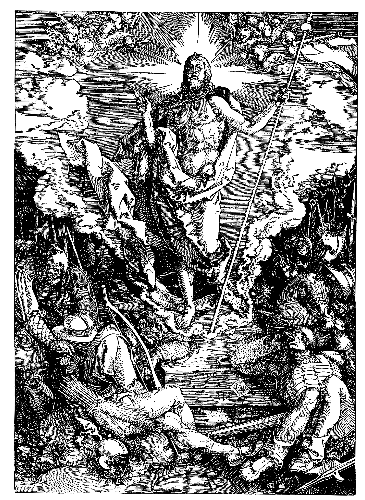
When is “education”? A theoretical argument, with ethnographic illustrations, for shifting the attention of the social sciences from “learning” as a process with lasting individual consequences, to “education” as an open, collective, and deliberative process of continual transformation and change.
Let us pay attention to what, as educators, social scientists, and parents, we want to celebrate and understand. Here is humanity at work:
A four year-old girl, in a pew at church, is playing while her mother sings in the choir. She picks up the music program, looks intently at the front illustration (a wood print of the Resurrection of Jesus from the 16th century with the figures of two sleeping guards at the bottom). The child leans towards a 16 to 18 year old boy next to her, points at the guards and asks a question. The boy leans into her, answers, and then elaborates as he points to other parts of the picture. The child asks a new question that leads to further elaborations. And then she looks around and moves on to another item as the boy returns to what he had been doing.
What we have here is an occasion for education.
ABSTRACT
In the 1970s, Cremin urged researchers to remember that education is more than schooling. As cultural anthropologists, we push this idea. We argue theoretically, and through summaries of two case studies, that education is a fundamental human activity. Starting with education would be a major advance that would free researchers from the difficulties produced by postulating “learning” (enculturation, socialization, etc.) as fundamental to sociability. To make this argument we pick up two key terms in Cremin’s definition: “effort,” and “deliberation.” Through a contrast with Bourdieu’s theory of habitus, we show that both words make sense in terms of an amended take on Garfinkel’s ethnomethodology and Lave’s understanding of learning as movement through differentiated social fields (“communities of practice”). This is illustrated through two ethnographic research projects. The first was conducted in the dormitory of a small liberal arts college and focused on students conversing about their friends and their sentimental relationships. The second was conducted in the clinics, hospitals and laboratories through which the Swedish elderly must progress as they are diagnosed and treated as “hard-of-hearing.” Both projects examine the set of conversations through which the participants conducted what we refer to as “difficult collective deliberations.” We show how these conversations are best taken as attempts 1) to understand the actual conditions presented by their co-participants and the materials being brought to the conversation; 2) to explore how these conditions can be used; 3) how all this can be changed either to return the event to some sort of order, or to change this order. The case studies show how this can work at two very different scales: in face-to-face interactions among an almost closed group of people, as well as in bureaucratic interactions involving a large number of people setting conditions for each other, but not necessarily meeting face-to-face. This process is an educational one which shapes institutions like schooling both as systems of positions and settings, and as daily experiences for students, teachers, and administrators. This paper is another warning to educational researchers that focusing mostly on schooling will hide much that drives the evolution of schooling, and the resistance of many to its manifestations. (and as processed by Wordle)
SUMMARY
Full text as published
(The html version is essentially the same with some hyper-links. It can be useful for pedagogical purposes but the full text is the one that should be referenced in publication)
References
[the first full version of this article that triggered the special issue of the Teachers College Record. This version was co-authored with James Mullooly, Portia Sabin, and Alison Stratton]